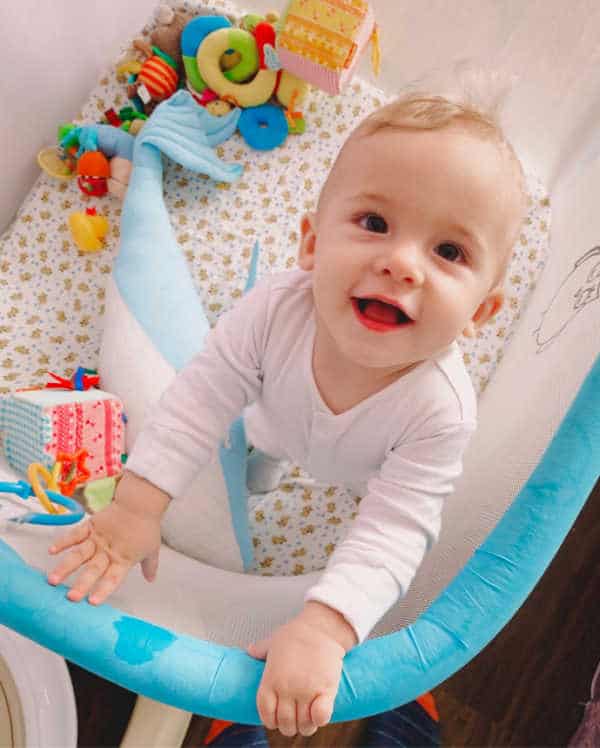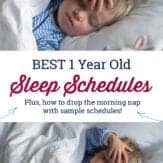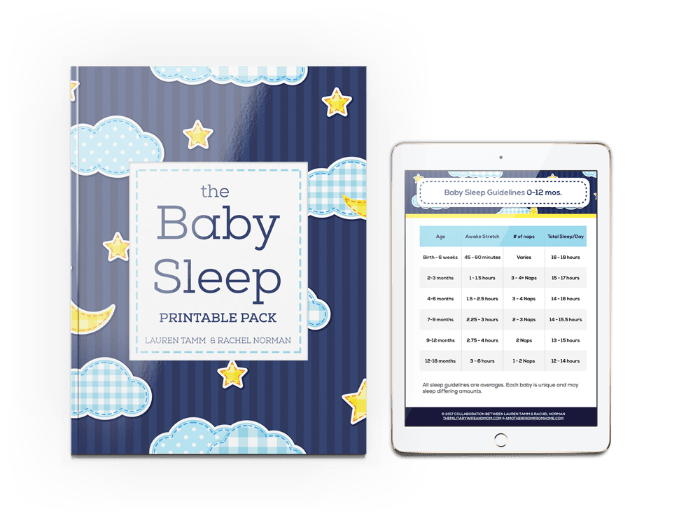Sometimes you hear advice that a 1 year-old sleep schedule or routine is going to bog you down. It’s like a nagging chore you cannot erase.
Instead, they say to live free and go with the flow.
Let’s just be whimsy, they say.
That is…until you’re about to lose your ever-loving-mind with a one year-old tantruming child who will not sleep consistently – chaos ensues and mama gets an eye twitch.
Here’s the truth: With the right 1 year-old daily schedule – that includes a balance of structure and spontaneity – you will actually feel a lot more confident and free as a parent than if you subscribed to no plan days.
Over the years, I’ve helped thousands of parents craft daily schedules, nap schedules, sleep schedules and activity routines for their 1 year olds. And I’d love to help you too.
On This Page…
Key components of an excellent 1 year-old schedule.
When creating your ideal daily schedule for your 12 month old, here are some bullets to timeblock:
- Wake up time
- Structured play time
- Independent play time
- Nap time
- Meal times
- Spontaneous / free time
- Bedtime
Personally, I like to run a 7 am wake up time and a 7 pm bedtime. Most kids baby through elementary-age (yes, really!) need about 12 hours of downtime from evening to am. Now, they may not be sleeping the whole time, but relaxing, low-stimuli is key.
Every child and every family is different, and you may find yourself preferring a 6 am to 6 pm schedule OR a 6 am to 7 pm schedule OR a 7 am to 8 pm schedule OR a 8 am to 8 pm schedule.
You get the idea.
However, the overall goal is to — ballpark — keep wake up time and bedtime approximately 12 hours apart.
When to incorporate structured playtime and independent playtime into a 1 year-old schedule?
Most 1 year-olds are most rested and able to focus, sit still and play in the morning hours. The next best time slot is right after the afternoon nap.
When time blocking structured or independent play, I would personally go for immediately after breakfast or immediately afternoon nap and snack.
It is completely reasonable for a 1 year-old to play on their own for 30 minutes. For more on how to accomplish that, check out these posts:

What’s up with 1 year old naps?
The question I get most from parents is does my 1 year old need two naps or one nap?
And the simple answer is this: It depends.
When you reach the age range of 14-18 months you are likely right around the time of dropping the morning nap. For some little ones it may be a little bit sooner; for others, later. Once you reach this range, you will probably notice you hit a bit of a ‘grey zone’ where two naps seems like too many, and one nap seems like too little. It can be a bit of a tricky time to navigate.
In our home, we were in the grey zone for what seemed like forever. With two naps, he struggled to fall asleep and stay asleep for the afternoon nap. With one nap, he was a force to be reckoned with by lunch time.

When preparing for a future nap schedule with only one nap, here’s what I like to do:
- Keep the morning nap short at 1.5 hours or even 45 minutes.
- Keep the afternoon nap long at 2 hours or more.
How to guide: Dropping the morning nap in four simple steps
1 year old sample schedules – let’s bring it all together.
These are real schedules from real parents, who are currently using them. But as a caveat, I will say, these are ballpark schedules that parents aim for the majority of the time. Kids aren’t robots 🙂

12 month old girl schedule (2 naps)
- 6:30 am wake up time
- 7:00 am breakfast
- 7:30 am independent playtime
- 8:30 am park time
- 9:30 am naptime
- 11 am wake up
- 11:30 am lunch time
- 12:00 free play time / adventures / errands
- 2:00 pm nap time
- 4:00 pm wake up / light snack
- 4:30 pm structure playtime
- 5:30 pm dinner / family time
- 6:30 pm start bedtime routine
- 7:00 pm lights out
12 month old (daycare, 1 nap)
Note: As a mom, this is not my favorite schedule. My son is not ready for only 1 nap but that is how the daycare does it.
- 7:30 am wake up / get dressed / breakfast
- 8:15 am leave for daycare
- 8:30 am daycare drop off
- 8:40 am get to work
- 12:30 – 3:00 pm naps at daycare
- 5:00 pm pick up from daycare
- 6:00 pm dinner at home
- 6:30 pm family time
- 7:30 pm bedtime routine
- 8:00 pm bedtime
14 month old twins (2 naps / SAHM)
- 6:00 am kids wake up (usually one wakes the other. I let them have quiet play in their cribs for a bit while I get myself ready for the day).
- 6:30 am get kids up / fed breakfast / free play in kitchen
- 7:30 am independent playtime (1 in playpen, 1 in crib)
- 8:00 am free play
- 9:00 am short nap 45 mins to 1 hour
- 10:00 am playdates / parks / errands / snack on the go.
- 12:00 pm home for lunch
- 1:00 pm nap
- 2:30 – 3:00 pm wake up (usually closer to 2:30 pm)
- 3:30 pm walk around neighborhood / play in yard
- 5:00 pm dinner / family time
- 7:00 pm bedtime routine
- 7:30 pm bedtime
15 month old girl schedule (1 nap / daycare)
- 7:00 am wake up
- 7:20 am breakfast
- 7:45 am leave for daycare
- 8:00 am arrive at daycare
- 9:00 am daycare offers snack
- 11:30 am daycare offers lunch
- 12:30 pm daycare naptime
- 3:00 pm daycare naptime ends
- 4:15 pm pick up from daycare
- 4:30 pm arrive home / free play in kitchen while I cook
- 5:30 pm family dinner
- 6:00 pm family time / reading time
- 7:00 pm bedtime routine / bath
- 7:45 pm bedtime

17 month old boy schedule (1 nap)
- 6:45 am usually wakes up / gets soft toys, water in sippy cup, plays in crib
- 7:00 am get baby out of crib and dressed for the day
- 7:30 am breakfast
- 8:00 am stroller walk in neighborhood, then we play together
- 9:30 am free play
- 10:00 am snack, then errands / quick outings to park, etc.
- 12:00 pm home and lunch
- 12:45 pm nap routine (quiet reading, sing song, cuddle)
- 1:00 pm nap
- 3 – 3:30 pm wakes up from nap, snack
- 3:45 / 4:00 pm independent playtime in playpen downstairs (I’m in earshot, but out of sight)
- 4:30 structured play in kitchen or fenced backyard while I cook dinner
- 5:00 / 5:30 pm dinner
- 6:30 pm bath, stories, downtime together upstairs with mom or dad
- 7:15 pm bedtime
18 month old girl daily schedule (4 year old older sibling)
- 6:00 am I wake up, get myself ready
- 6:30 am wake up both kids, get them dressed
- 6:45 am breakfast, put dinner in crockpot for that night
- 7:15 am leave the house
- 7:30 am drop 1.5 yo at daycare / 4 yo at preschool
- 8:00 am get to work
- 9:30 am daycare offers snack
- 12:00 am daycare offers lunch
- 1 – 3:00 pm daycare naptime
- 4:30 pm pick up from daycare / preschool
- 4:45 pm home, unpack
- 5:00 pm play with kids
- 5:45 pm dinner
- 6:30 pm bedtime routine
- 7:00 pm reading time with dad
- 7:30 pm bedtime
1 year old nap schedule (13 months)
- 6:00 am wakes up
- 6:30 am breakfast
- 9:00 am nap #1
- 10:00 am wakes up
- 11:30 am lunch
- 1:00 pm nap #2
- 2:30 pm wakes up
- 5:30 pm dinner
- 6:30 pm bedtime routine
- 7:00 pm bedtime
Activities for 1 year old during daily schedule
These are some of my favorite places to find activities to do with a 1 year old, keeping them busy throughout the day!
- 100+ No-Prep Activities for 1 Year Olds (Happy Toddler Playtime)
- 40 Fun and Easy Activities for 1 Year Olds (Busy Toddler)
- 40 Best Activities for 1 Year Olds – Sensory (Days With Grey)
Frequently asked questions about 1 year old sleep schedules:
Usually 1-2 naps with most kids transitioning from 2 naps down to 1 afternoon nap around 14-18 months. It really depends on the child and how much nighttime sleep they are getting.
Most 1 year olds need about 12-14 hours of sleep per day. Adding up nighttime sleep with hours from both naps can help guide your decision. See above for my how-to guide when dropping the morning nap.
For morning routines, pre-meal routines, nap routines and bedtime routines, keep things short, yet very consistent. When you follow a very similar routine each night (i.e. bath, jammies, a short song, a short book), it helps cue the child’s body for sleep and the body will start to release sleep hormones in anticipation. Yay!
Most 1 year olds thrive on a bedtime between 6-8 pm. If you put your 1 year old to bed late, they may have more nighttime waking and earlier morning wake ups, leading to an overtired and fussy child.
For some children, waking during the night is completely normal. Even elementary-age children may wake once per night to use the restroom. The goal is to minimize the frequency of night waking and the duration of night waking. Many of the sample schedules above are a great tool to support quality nighttime sleep and decrease night waking.
Of course you can, BUT you probably don’t want to 🙂 Most 1 year olds thrive on the physical boundary of a crib. In addition, the crib offers parents HUGE peace of mind of safety, knowing their child isn’t roaming the house without supervision at night. Holding off on a toddler bed until 2.5 – 3 years can support your child’s sleep and a parent’s sanity.
Usually, yes. However, in the presence of multiple children or daycare schedules, one nap per day may be the best you can do. By 14 months, your child may be less fussy in the morning and better able tolerate one afternoon nap. Hold off until at least 14 months if you can.
Go slow and expect lots of ups and downs. Using any of the sample schedules above can be a great jumping off point for supporting a better 1 year old sleep schedule.
Additional Resources:
Deluxe Daily Routine Bundle – Save 60%
Your ultimate toolkit for creating routines with kids! Visual routines, printable schedules, checklists for moms and more!
More posts you’ll love:
- 5 Sample Daily Toddler Schedules From Real Moms
- 2 Year-Old Sleep Regression Explained! And How To Fix It!
- 2 Year-Old Sleep Schedule That Works Every Time
- 4 Year Old Sleep Schedules – Easy to Use With Examples
- How to Put a Toddler to Sleep Fast
- Best Morning Routine Tips and Tricks
- Quick and Easy Toddler Bedtime Routine That Works Like a Charm
- Easy Morning and Bedtime Routine Chart That Keeps Kids on Task
- The Newborn Routine That Will Help Baby Fall Asleep Faster
I've created a free email series just for you! If you are struggling with finding a routine, rhythm or schedule, this email series will help you find one that will work for YOUR family. Yes, really. I've seen my sample routines work time and time again for parents. I know it can work for you too.
This free email series will help you:
- Free sample routines for your child
- Best morning routine tips and tricks your kids will actually follow
- All-time favorite parenting hacks for getting more cooperation at bedtime
- Step-by-step guide for using a printable daily schedule with kids












I am an older mom, grandmother that is. Raising my grandson, 1 year old last week.. I cannot tell you how much your information has helped. Haven’t had babies around for 50 years, things have really changed.